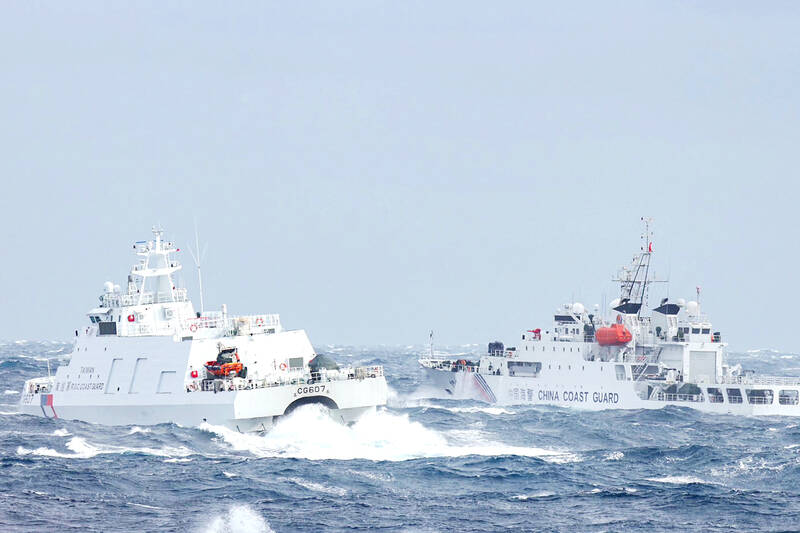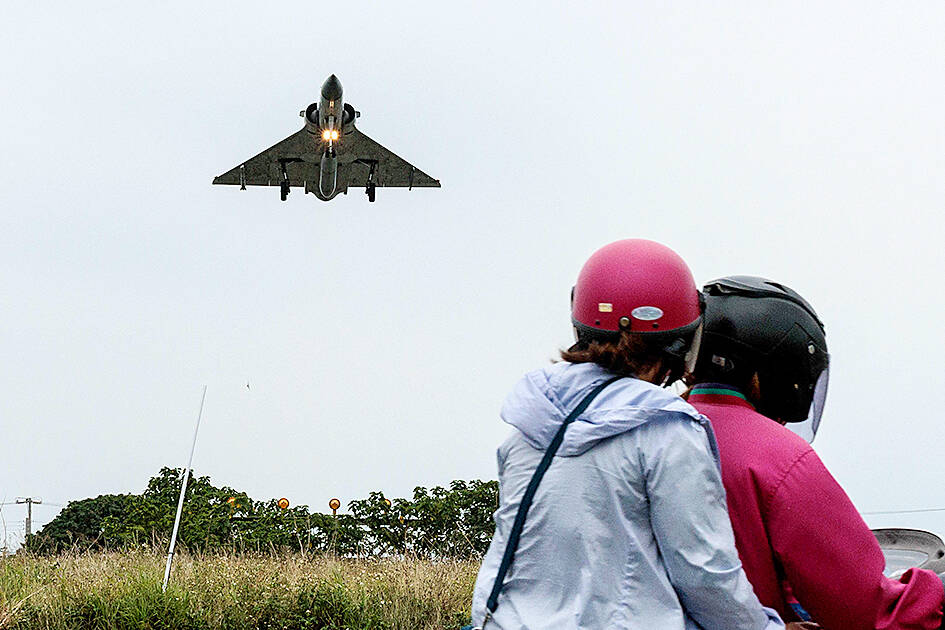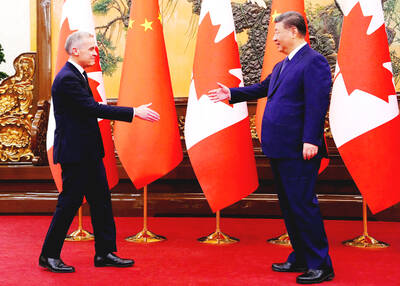The latest military exercises conducted by the People’s Liberation Army (PLA) last week did not follow the standard Chinese Communist Party (CCP) formula. The US and Taiwan also had different explanations for the war games.
Previously the CCP would plan out their large-scale military exercises and wait for an opportunity to dupe the gullible into pinning the blame on someone else for “provoking” Beijing, the most famous being former house speaker Nancy Pelosi’s visit to Taiwan in August 2022. Those military exercises could not possibly have been organized in the short lead time that it was known she was coming.
There is one exception to this rule: the military drills held on June 21, which initially did not appear to be connected to anything. A report in the Liberty Times (the Taipei Times’ sister newspaper) two days later, however, said there had been a secret meeting on June 20 in Taipei involving two US deputy assistant secretaries of state, ambassadors of Taiwan’s 12 formal diplomatic partners and the representatives of friendly countries. This column connected the two as the most likely explanation.

Photo: AFP
Like the June exception, the CCP launched the exercises last week with little advance notice or connected it to anything that annoyed Beijing. It is possible that they were once again sending a message about something not publicly known.
There is another possibility: That this is something new.
THEORIES

Photo: AFP
There are two theories floating about. One is that these exercises were communist crankiness over President William Lai’s (賴清德) recent tour of the Pacific that included Hawaii, Guam and the remaining formal diplomatic partners in the region. The other was muscle flexing as a message to the incoming Trump administration, though it seems more likely that they would have held the exercises closer to his inauguration on Jan. 20.
The problem with both theories is that if they were true the CCP would have said so and cranked up their state-owned mouthpieces into high gear. A senior Taiwanese security official termed the activities as “drills that dare not speak their name.” Instead, they remained silent during the exercises and when asked about them, their spokespersons downplayed them by giving boilerplate responses.
The Global Times reported that Chinese Ministry of National Defense spokesperson Wu Qian (吳謙) said: “As water has no constant form, there are in warfare no constant conditions.” He added: “The PLA will decide whether and when to conduct military exercises in accordance with its needs and the situation on the ground.”
The first line — a quote from Sun Tzu’s (孫子) Art of War — reminds us that the CCP considers itself actively at war (more on the second line below).
TAIWAN STRAIT AS INLAND SEA
Ministry of National Defense spokesperson Sun Li-fang (孫立方) said the scale of the current Chinese naval deployment was the largest since China held war games around Taiwan ahead of the 1996 presidential elections. The American Institute in Taiwan’s (AIT) description was tamer, saying that “PRC military activity is elevated in the region, consistent with levels we have seen during other large exercises.”
Yet AIT also had this to say: “The elevated activity in the East China Sea and South China Sea follows a broader increase in the PLA’s military posture and military exercises over the last several years. With that said, we do not see this wider activity as a response to President Lai’s transit.”
Note “wider activity,” “elevated activity” and “broader increase.” Diplomats choose their words very carefully and including those references was no accident.
Lieutenant General Hsieh Jih-sheng (謝日升) described the drills as a PLA attempt to simulate a blockade on Taiwan and extend forces outward to achieve its anti-access/area denial (A2/AD) objectives. At the same time, it has formed two naval “walls” east of Taiwan to convey the message of “turning the Taiwan Strait into an inland sea” to lower people’s vigilance.
THREE POSSIBILITIES TO WATCH
There are at least three mutually reinforcing new possibilities.
The first is “normalizing” the exercises.
“I clearly believe this is the beginning of the mid-stage of normalization,” said Democratic Progressive Party Legislator (DPP) Chen Kuan-ting (陳冠廷), who sits on the legislature’s Foreign Affairs and Defense Committee.
Secondly, the silence and suddenness of the exercises may be more unnerving, and adds psychological pressure that is more valuable than trying to pin the blame elsewhere.
Others have noted that the Chinese military said after the military exercise that future military exercises could be turned into actual combat at any time depending on the specific situation.
If true, it could suggest they have been thinking about laying the groundwork for a scarier unpredictability that would keep Taiwan’s armed forces, leaders and public perpetually off balance and uncertain.
A third possibility is that Beijing no longer views the messaging as just to Taiwan, but rather the entire region. The increased geographic scale could be preparation for taking on multiple nations at once, but could also include preparation for invading the Senkaku Islands — called Diaoyutai (釣魚台) in Taiwan — or even Ryukyu Islands.
In this context, PLA spokesperson Wu Qian’s quotes above make a lot more sense. During the exercises, the Global Times also ran a piece “Japan ‘doesn’t need to be nervous’ about PLA warships’ Miyako Strait transit: expert.”
For anyone who knows anything about the CCP, this translates as “be very nervous.”
Donovan’s Deep Dives is a regular column by Courtney Donovan Smith (石東文) who writes in-depth analysis on everything about Taiwan’s political scene and geopolitics. Donovan is also the central Taiwan correspondent at ICRT FM100 Radio News, co-publisher of Compass Magazine, co-founder Taiwan Report (report.tw) and former chair of the Taichung American Chamber of Commerce. Follow him on X: @donovan_smith.

On a harsh winter afternoon last month, 2,000 protesters marched and chanted slogans such as “CCP out” and “Korea for Koreans” in Seoul’s popular Gangnam District. Participants — mostly students — wore caps printed with the Chinese characters for “exterminate communism” (滅共) and held banners reading “Heaven will destroy the Chinese Communist Party” (天滅中共). During the march, Park Jun-young, the leader of the protest organizer “Free University,” a conservative youth movement, who was on a hunger strike, collapsed after delivering a speech in sub-zero temperatures and was later hospitalized. Several protesters shaved their heads at the end of the demonstration. A

Google unveiled an artificial intelligence tool Wednesday that its scientists said would help unravel the mysteries of the human genome — and could one day lead to new treatments for diseases. The deep learning model AlphaGenome was hailed by outside researchers as a “breakthrough” that would let scientists study and even simulate the roots of difficult-to-treat genetic diseases. While the first complete map of the human genome in 2003 “gave us the book of life, reading it remained a challenge,” Pushmeet Kohli, vice president of research at Google DeepMind, told journalists. “We have the text,” he said, which is a sequence of

In August of 1949 American journalist Darrell Berrigan toured occupied Formosa and on Aug. 13 published “Should We Grab Formosa?” in the Saturday Evening Post. Berrigan, cataloguing the numerous horrors of corruption and looting the occupying Republic of China (ROC) was inflicting on the locals, advocated outright annexation of Taiwan by the US. He contended the islanders would welcome that. Berrigan also observed that the islanders were planning another revolt, and wrote of their “island nationalism.” The US position on Taiwan was well known there, and islanders, he said, had told him of US official statements that Taiwan had not

Britain’s Keir Starmer is the latest Western leader to thaw trade ties with China in a shift analysts say is driven by US tariff pressure and unease over US President Donald Trump’s volatile policy playbook. The prime minister’s Beijing visit this week to promote “pragmatic” co-operation comes on the heels of advances from the leaders of Canada, Ireland, France and Finland. Most were making the trip for the first time in years to refresh their partnership with the world’s second-largest economy. “There is a veritable race among European heads of government to meet with (Chinese leader) Xi Jinping (習近平),” said Hosuk Lee-Makiyama, director